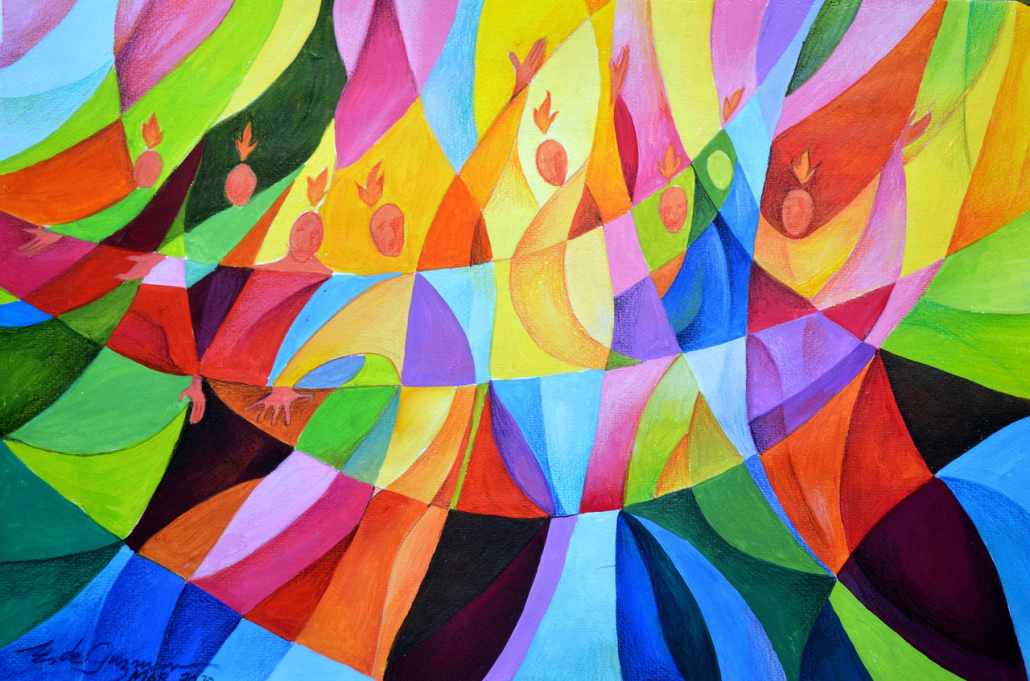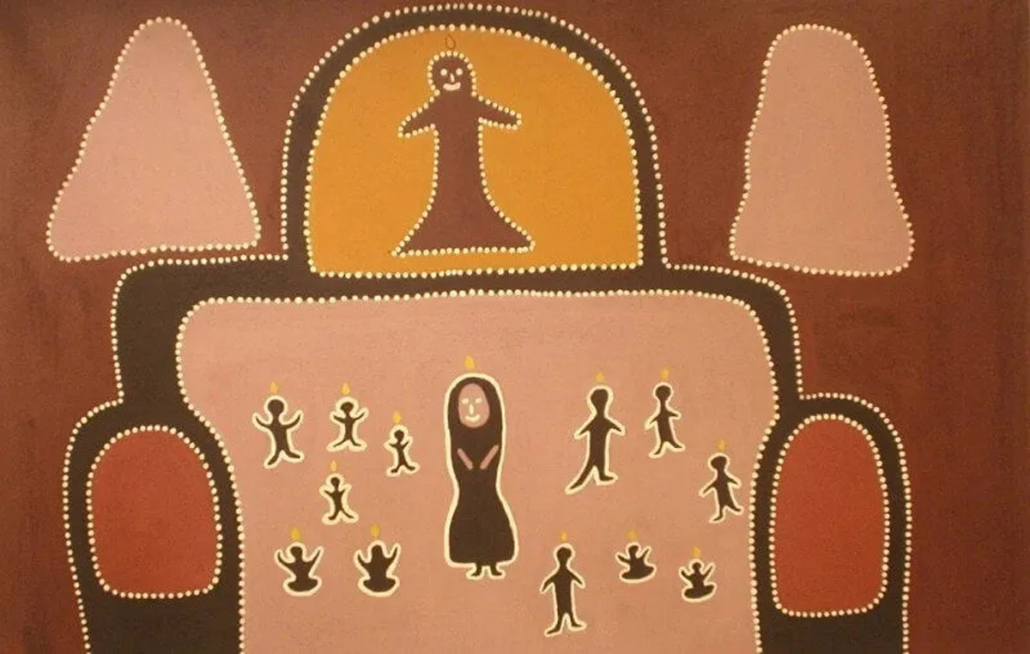Image: ‘Pentecost’ by Edgardo de Guzman (https://www.imaginor.co.uk).
‘Greater works than these’
Bible study prepared by Andrew
June 2022
Key text: John 14:8-17
Themes: Faith and works, teaching and learning, relationship, Church, the Body of Christ, sacraments …
Readings
Matthew 11:11
John 5:19-21
John 20:21–23
1 Corinthians 12:4
1 Corinthians 12:29–30
Background
John 13-17 is known as the Farewell Discourse of Jesus. It begins with the Foot Washing and includes the New Commandment, the reference to God’s house with many dwelling places, the promise of the Paraclete (Spirit of truth), the image of the True Vine, and Priestly Prayer for Unity.
Jesus is about to be arrested and suffer a cruel and unjust death. The disciples themselves will be scattered. But Jesus assures them that, no matter what happens, God’s work will continue in the world.
Artworks

Image: ‘Pentecost’ by Edgardo de Guzman (https://www.imaginor.co.uk).

Image: Charlene Carrington, ‘The Pentecost’ depicts the event (https://blackfriars.sa.edu.au). Born in Perth in 1977, Carrington grew up at Warmun Community, Turkey Creek, Western Australia.
![]()
Image: Orthodox Icon Descent of the Holy Spirit.
Introduction
μειζονα (meizona), the original Greek word translated “greater” in John 14:12, means either greater in degree or greater in quantity.
Three aspects of religion (three approaches to reading)
- Poetics (What qualities of language or expression do we notice? Are there key words, phrases or images? What is the tone or feeling of the text?)
- Ethics (Whose calls for help, whose calls to justice do we perceive? How will we respond?)
- Metaphysics (Are we offered insights regarding the world? How might we describe or come to experience this world we live in?)
Read the following comments on John 14:8-17 and assign each to one or more of the “aspects”. What further questions are raised for you?
- “[Jesus] says it’s because he’s going to the Father; that’s why we could do things greater than he. Because he was only coming to start the liberation, and we should continue it, and the liberation will gradually get greater and greater” (William, The Gospel in Solentiname).
- “The individual dies but we go on living, and it’s not that we go on living without a body but with a body in common, which is the body of Christ, all of humanity, unified. Since the individual body dies, he speaks of taking us to the Father’s house, which means a collective life …” (Ernesto Cardenal, The Gospel in Solentiname).
- “[T]he work of Jesus is to reveal the Father. Jesus reveals who God is – a God of goodness, compassion, and forgiveness. The work of Jesus is also to give life. And life is relationship …” (Jean Vanier).
- “The strongest sign of great power is when a person does extraordinary things not only by himself but also through others” (St Thomas Aquinas).
- “I suggest the changing of a human heart (spiritually) is a far greater miracle than the healing of a human body (physically)” (Anonymous, after Aquinas).
- “It is surely true that we cannot do greater works than Christ without him, but the works we do with him are still really and truly our works. Miracles, preaching, and repenting are the stuff of the life of God’s saints and the Church” (Fr Hugh Barbour).
- “God who created you without you, will not save you without you” (St Augustine of Hippo).
- “There is no greater work possible than the conversion of a soul” (J.C. Ryle).
- “Jesus returns with limitless power via the Holy Spirit …” (Samuel Cruz).
- “Miracles, of course, are still the least significant works, since they are only physical and are performed for only a few people. But let us consider the true, great works of which Christ speaks here [conversion of souls via Word and Sacrament] – works which are done with the power of God, which accomplish everything, which are still performed and must be performed daily as long as the world stands” (Martin Luther).
- “This doesn’t mean that Jesus’ disciples are greater than he is. It does mean that their works are greater than his in this respect – that they are privileged to participate in the effects of Jesus’ completed work” (Don Carson).
- “So how can we hope for repair of the world? Certainly not by waiting for God to do it for us. Not by ignoring the spirit of wisdom that whispers, that breathes, within each of us always. Each of us individually … But each, only in our all-togetherness — human, animal, vegetable, mineral” (Catherine Keller).
Songs
Louis Armstrong, “What a Wonderful World”, 1967.
Bruce Springsteen, “Working on a Dream”, 2009.
Sia, “Never Give Up”, 2017.


